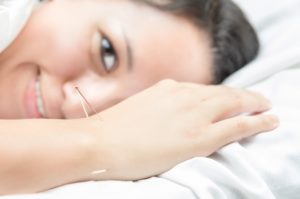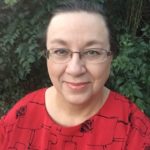By Jamie Graham
Twenty-two years ago, I found myself lying on a massage table with fine thin needles being inserted into various parts of my body. The problem that had brought me to this unusual position was a monthly fluctuation in moods called Premenstrual Syndrome, accompanied by severe debilitating cramps. During my monthly cycle, I would swing between tears and irritability. Acupuncture had been recommended to me by a friend whose sister was attending the Academy of Oriental Medicine at Austin (AOMA). My friend assured me her sister, or one of her fellow interns in the student clinic at AOMA, would be able to help both with the pain and the moods.
 Being in such misery, I was willing to try anything. During my treatment, which included two interns and an instructor asking questions, taking my pulse and looking at my tongue, I mentioned I often had a feeling of something being stuck in my throat that wouldn’t go down when I swallowed. A look of understanding passed between the two interns and one of them explained this was something Chinese medicine called Plum Pi Qi and it clearly was indicated in my diagnosis of Liver Qi stagnation. After the needles were removed, they also gave me an herbal formula and recommended I return for future treatments.
Being in such misery, I was willing to try anything. During my treatment, which included two interns and an instructor asking questions, taking my pulse and looking at my tongue, I mentioned I often had a feeling of something being stuck in my throat that wouldn’t go down when I swallowed. A look of understanding passed between the two interns and one of them explained this was something Chinese medicine called Plum Pi Qi and it clearly was indicated in my diagnosis of Liver Qi stagnation. After the needles were removed, they also gave me an herbal formula and recommended I return for future treatments.
I was amazed at the results. I felt calmer, more centered and as a bonus, during the next monthly cycle, my cramps were much reduced. I was hooked.
Six years later, I was the intern seeing clients in the student clinic at AOMA. Many of those clients had mental health issues, ranging from depression, anxiety, grief, anger, PTSD and many others.
At AOMA, we learned emotional issues were related to stagnation of an energy called Qi (pronounced chee). Each emotion was also related to a specific organ system. Grief was related to lungs, anger and depression to liver, fear to kidneys, worry to spleen, overjoy (mania) to heart. By releasing this stagnation with the acupuncture needles and rebalancing the specific organ system, these mental health issues could eventually be resolved.
After graduation, I began to research how acupuncture helps resolve these issues. Western medicine had begun doing research studies on acupuncture. While many of these focused on pain, several of them also focused on mental health issues. There are many theories as to why acupuncture helps pain and other issues such as depression, anxiety and PTSD, one of the things we do know is acupuncture affects brain chemistry. It causes the body to release endorphins, serotonin, and enkephalins and other brain chemicals that help our body with pain, emotions and our immune system. It also increases receptor sites for these chemicals to attach to within the body.
One of the most interesting continuing education classes I have taken was working with veterans suffering from PTSD through an organization called Vet TRIIP (Veterans Team Recovery Integrative Immersion Process). This organization uses a multi-disciplinary approach to working with veteran PTSD. They incorporate tai chi or qigong, acupuncture, massage therapy, chiropractic, talk therapy and other modalities to help the veterans in their recovery.
The first veteran I treated was one who was, “wound very tight.” He had chronic pain in his lower back and neck. Using just a few acupuncture needles and sitting with him quietly, I watch as the tension left his body. After the needles were removed, he stood up, and a smile came across his face as he realized his pain had eased. “I feel so relaxed,” he said, “and the pain is much less.”
Another veteran I worked with was also a survivor of sexual assault. She was having severe anxiety and insomnia. She also had chronic pain. She, too, was very tense—emotionally and physically. During the treatment, she was actually able to fall asleep, and afterwards told me she felt calmer, like she could finally take a deep breath.
Of course, veterans with PTSD aren’t the only ones to benefit from acupuncture’s effects on mental health issues.
Another training I took is called NADA (National Acupuncture Detoxification Association). This simple 5 needle acupuncture, done entirely in the outer ear, has been used to help people wean off drugs, alcohol and tobacco. One of its main effects is to help reduce stress and anxiety. It was used by acupuncturists to help first responders and victims deal with stress after 9/11, Hurricane Katrina and many other disasters. It’s also used by Acupuncturists Without Borders when they respond to disaster sites around the world.
I use NADA quite often in conjunction with body acupuncture for my clients experiencing stress, depression or anxiety. One of the main points in this treatment is Shen Men, which translates as Spirit Gate. Quite often, if someone is in a stressful situation, I will add a very tiny (.06 mm) needle on a piece of tape to Shen Men, to help them deal with stress after they leave the clinic.
During my 16 years of treating clients with acupuncture, I’m still amazed when someone sits up from the treatment table with a relaxed smile on their face as they tell me how calm and energized they feel. And often, that’s just a side benefit from other issues we’ve been addressing. It’s one of the reasons I love my work.
 Jamie Graham is the owner of Healing Touch Acupuncture and is a licensed acupuncturist practicing in Waco. She has a Master of Science in Oriental Medicine from the Academy of Oriental Medicine at Austin. She and her husband, Bob, will be celebrating 43 years of marriage in March. She has one daughter and one grandson who are the joy of her life. She is owned by a Russian blue cat named Walter and a very spoiled shih tzu named Brandi. When she’s not using needles as an acupuncturist, she uses different kinds of needles in her textile art, quilting, knitting and embroidery work.
Jamie Graham is the owner of Healing Touch Acupuncture and is a licensed acupuncturist practicing in Waco. She has a Master of Science in Oriental Medicine from the Academy of Oriental Medicine at Austin. She and her husband, Bob, will be celebrating 43 years of marriage in March. She has one daughter and one grandson who are the joy of her life. She is owned by a Russian blue cat named Walter and a very spoiled shih tzu named Brandi. When she’s not using needles as an acupuncturist, she uses different kinds of needles in her textile art, quilting, knitting and embroidery work.
You may contact Jamie at Healing Touch Acupuncture: 254-759-8050 | [email protected] | www.healingtouchacupuncture.com | www.Facebook.com/HealingTouchAcupuncture
The Act Locally Waco blog publishes posts with a connection to these aspirations for Waco. If you are interested in writing for the Act Locally Waco Blog, please email [email protected] for more information.
With this post we are kicking off the Act Locally Waco mental health blog. We hope to post something once a month or so with a focus on mental health. Stay tuned! — ABT
By Bonnie Goree
Major depression has been a familiar struggle in my adult life. I was just completing junior college when my first episode occurred. I noticed that I could not focus and complete a term paper – my brain felt ‘frozen.’ I had difficulty sleeping and my cognitive skills and mood continuously declined. Another episode occurred in my late thirties, after having major surgery. The surgery was a shock to my system and drastically upset my chemistry, which led my mood to decline again. Between 2006 and 2011, I experienced multiple episodes of major clinical depression, requiring hospitalizations, medicine changes, and Electroconvulsive-Therapy (ECT). My struggle with this disorder reached its peak in 2010, when I had to leave my job of almost twenty years as an Early Intervention Specialist at Heart of Texas Region MHMR. Although I received amazing love and support from my coworkers, at one point I was so depressed that I stayed in bed for 3 days and had thoughts of ending my life. I was feeling so discouraged and hopeless. I had never thought these things would happen to me.
During that difficult time, a friend told me about Mental Health Grace Alliance (MHGA) here in Waco. I met with the founders of this organization and cried throughout most of our visit. But, their support and unconditional acceptance gave me a glimmer of hope that day. I knew all too well the emotional effects of depression. I would sometimes blame them on my difficult childhood or even see them as a spiritual flaw, but it was not until I was connected with MHGA that I really learned about the physical and medical components of this disorder. I had never allowed myself to truly believe that a chemical imbalance could be a major contributor to depression and to other mental health diagnoses. In my experience ECT’s had been more helpful than medicine. Since 2011, however, my psychiatrist has found a combination of two meds that thankfully have worked well. In addition to the medicine, I also became involved in the Living Grace Groups through MHGA. There I met others who had been in the same boat as me and were experiencing hope and recovery.
How did God and my faith fit into my times of hopelessness? I had to wrestle and gradually come to terms with this question. I read in the book of Psalms multiple instances where David described ‘dark, hopeless’ days. I learned that there are many other people in the Bible and in our society that have experienced mental health difficulties. Mother Teresa, for example, wrote in her diaries about her struggles with depression. I also had amazing support from my church family. The bouts of depression have forged some deep, meaningful relationships that continue to this day.
The last part of the story is my favorite. Since 2012, I have been back at Heart of Texas Region MHMR as one of the first three Certified Peer Specialists of the organization. We have had the opportunity to create the job from the ground floor as a new service to adults struggling with mental illness. What an awesome opportunity and privilege I have to offer hope to others! I can relate and say “I’ve been there and done that.”
My journey to regaining life, hope, and healing has been hard but it is happening! It has included multiple vital pieces of the recovery pie: staying connected to supportive people, counseling, medical care, healthy eating, exercise, and giving back to help others. Do I ever have bad days? Yes. There are bumps along the road, but I have tools to get me through those days now. My faith continues to be a place where I find comfort, as I sense God tell me “We will make it through today together. I am holding you and loving you every step of the way.”
In closing, I would like to encourage those in our Waco community who are struggling with mental health difficulties. Know that there is help available: Don’t be afraid to seek it! If we get sick with the flu, we go to the doctor; so why not get help when facing a mental health challenge? Finally, if you have not suffered with mental illness, be assured that you know people who have. I especially urge those in our local congregations to get educated and seek out resources to offer members who are struggling, as I am aware that not everyone shares my experience of finding support in the church. May Waco be a community where mental health topics are not kept a taboo and where everyone can access the needed support for their own journeys of life, hope, and healing.
 This Act Locally Waco blog post was written by Bonnie Goree. Bonnie has lived in Waco for 24 years. She is from Hurst, Texas. She received her B.A. from Howard Payne University in Brownwood, Texas. She loves animals, and has 2 kitties, Mickey and Jerico. She has 2 nephews, 2 nieces and 2 great-nephews. She loves the outdoors, bike riding, music, and spending fun times with friends.
This Act Locally Waco blog post was written by Bonnie Goree. Bonnie has lived in Waco for 24 years. She is from Hurst, Texas. She received her B.A. from Howard Payne University in Brownwood, Texas. She loves animals, and has 2 kitties, Mickey and Jerico. She has 2 nephews, 2 nieces and 2 great-nephews. She loves the outdoors, bike riding, music, and spending fun times with friends.
The Act Locally Waco blog publishes posts with a connection to these aspirations for Waco. If you are interested in writing for the Act Locally Waco Blog, please email [email protected] for more information.
